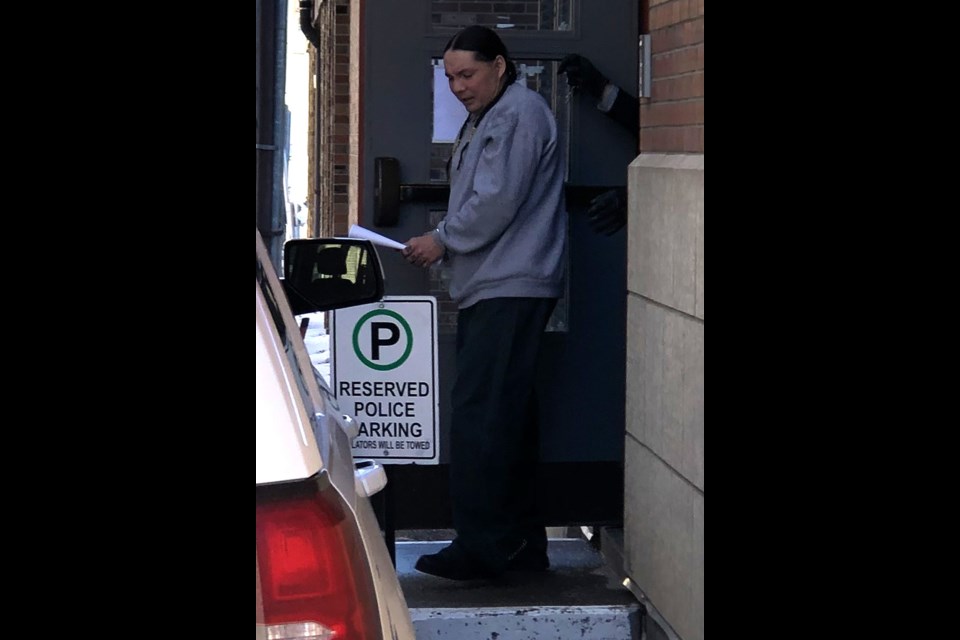Vincent William Picken, convicted of second-degree murder in the “senseless and unprovoked” attack of Shaun Holmes, will be ineligible for parole for 12 years, a provincial judge has decided.
Picken, 36, from Moose Jaw, appeared in Court of King’s Bench recently, where Chief Justice M.D. Popescul announced how long he would remain behind bars until he could apply to the Parole Board of Canada.
A conviction of second-degree murder carries a mandatory sentence of life imprisonment, with offenders forced to serve a minimum of 10 years.
“In my view, it is necessary to protect the public from you and prevent you from harming anyone else. It is also necessary to denounce your reprehensive behaviour and to deter you and all others from committing such terrible crimes in our community,” Justice Popescul.
After considering the factors, the judge said parole eligibility would be 12 years, which was less than the jury’s non-binding suggestion of 15 to 20 years, the Crown’s suggestion of 17 years and past case law.
Justice Popescul also prohibited Picken from ever again possessing firearms or similar weapons and ordered that he provide DNA samples.
Case facts
On Nov. 1, 2023, a jury found Picken guilty of the second-degree murder of Holmes, with a pathologist saying he discovered 35 injuries — seven stab wounds and 28 cutting wounds — across the victim’s upper body, Justice Popescul said in his decision.
The jury learned that on Oct. 28, 2020, around 3 p.m., Picken — who had consumed alcohol that morning — went to the Stadacona Street Apartments to determine if his girlfriend’s bicycle was in Holmes’ suite because she had lent it to a friend. He entered the suite via the rear fire escape stairs.
Exactly what transpired in the apartment is unknown, but a few minutes later, Holmes stumbled out mortally wounded and died shortly afterward, while Picken sustained minor injuries.
Picken testified that he acted in self-defence, but the jury rejected “beyond a reasonable doubt” that explanation. It was clear to jurists that the latter sought out the former and used a knife to inflict lethal damage.
“What has happened has ripped a hole in many people that cannot be filled. The victim impact statements that were filed outline, in graphic and heart-wrenching detail, the true and immutable pain that the family and friends of Mr. Holmes have suffered and will continue to suffer … ,” Justice Popescul said.
“The fact that the killing was so violent and so senseless adds to the trauma.”
Picken’s use of a knife was also “bothersome” because knife-caused deaths in Saskatchewan are a “major problem and must be denounced,” the judge added.
Judge’s analysis
Picken did not have a criminal record when he murdered Holmes, but while on bail, he committed 11 offences between May 30 and Aug. 12, 2020, the judge continued.
The Chilliwack, British Columbia-born man took several courses on remand and sought help from the prison chaplain, including regular Bible study classes. Moreover, a senior official from the Regina Correctional Centre described Picken as “one who is articulate, intelligent, and one who has displayed what appears to be accountability and a genuine remorse for what he has done.”
Also, he continues to seek psychological help, is medicated for depression and “is full of regret and remorse.”
When given the opportunity to speak during sentencing, Picken said he was “truly sorry” and “never hated Shaun.”
Justice Popescul acknowledged that Picken had a difficult life because domestic violence and substance abuse marred his childhood. Further, he was in foster care for several years after his mother attempted suicide, while he was a teen — and present — when she successfully killed herself at home.
The judge also considered Picken’s Aboriginal background using Gladue factors, which, while not a “get out of jail free” card, help judges craft a fit sentence for First Nations offenders.
“I find that Mr. Picken’s Indigenous background reduces, to some extent, his moral culpability,” Justice Popescul said, noting the man did not grow up on a reserve or attend residential schools.
The judge added that the Parole Board would determine whether Picken would ever be released.




